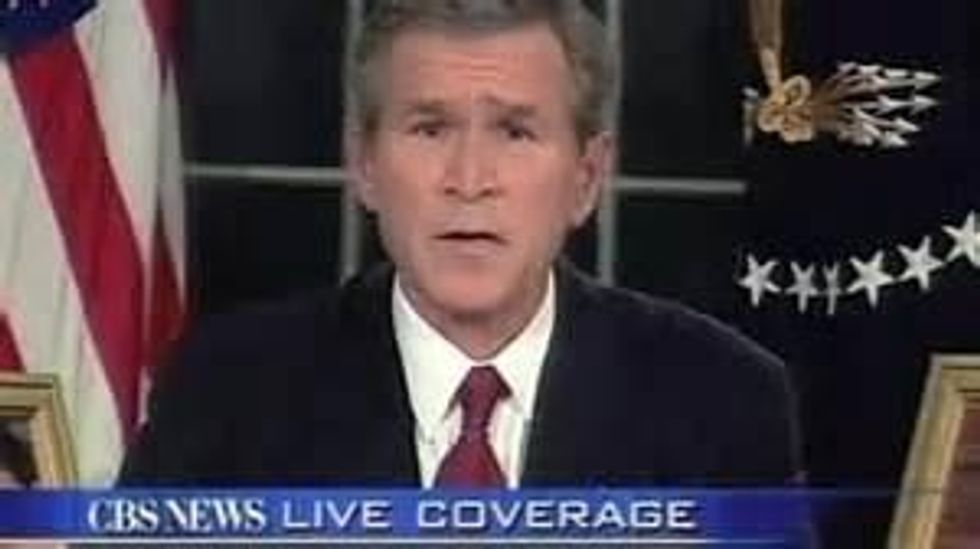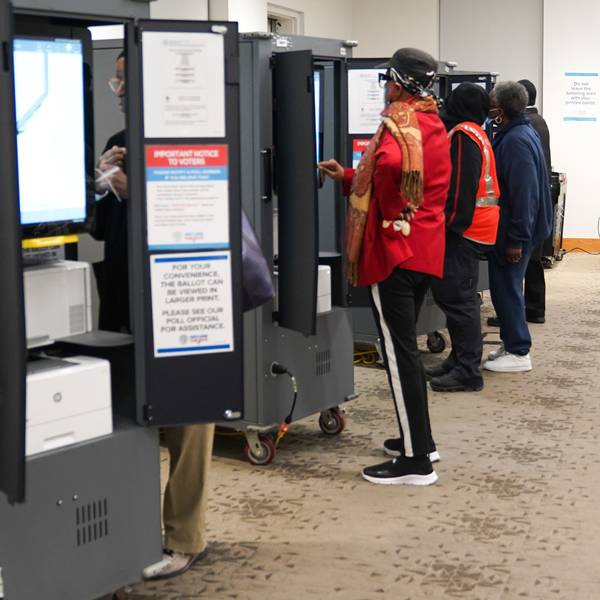Was George W. Bush Aiding Al Qaeda?
Bradley Manning never started an illegal war, but yet he remains the one facing 90 years in prison
A New York Times story (8/9/13) about the sentencing phase of the trial of Army whistleblower Bradley Manning caught my eye with this headline: "Witness in Manning Case Says Leaks Could Help Al Qaeda."

What the Times reported was this:
A prosecution witness in the sentencing phase of the court-martial of Pfc. Bradley Manning told a military judge on Thursday that Al Qaeda could have used WikiLeaks disclosures, including classified United States government materials provided by Private Manning, to encourage attacks in the West, in testimony meant to show the harm done by his actions.
So what was the evidence? The Times explains:
The witness, Cmdr. Youssef Aboul-Enein, an adviser to the Pentagon's Joint Intelligence Task Force for Combating Terrorism, said that WikiLeaks materials showing that the United States had killed civilians, for instance, could help Al Qaeda. "Perception is important because it provides a good environment for recruitment, for fund-raising and for support for Al Qaeda's wider audience and objectives," he said.
So the potentially most damaging part of Manning's disclosures was that the war kills civilians-and that U.S. enemies could use that fact to recruit others.
If that's the standard- that the killing of civilians might rally people behind the cause of Al Qaeda-then shouldn't someone be talking to George W. Bush about ordering the invasion that caused all the killing? Of course not-the only person facing punishment is the person who thought the rest of the world should know about it.
We-and certainly many others-have made the point that the prosecution of Manning should be treated seriously by journalists and press freedom advocates- especially now that the government is laying out its case about what it considers to be the harm done by WikiLeaks.
An Urgent Message From Our Co-Founder
Dear Common Dreams reader, The U.S. is on a fast track to authoritarianism like nothing I've ever seen. Meanwhile, corporate news outlets are utterly capitulating to Trump, twisting their coverage to avoid drawing his ire while lining up to stuff cash in his pockets. That's why I believe that Common Dreams is doing the best and most consequential reporting that we've ever done. Our small but mighty team is a progressive reporting powerhouse, covering the news every day that the corporate media never will. Our mission has always been simple: To inform. To inspire. And to ignite change for the common good. Now here's the key piece that I want all our readers to understand: None of this would be possible without your financial support. That's not just some fundraising cliche. It's the absolute and literal truth. We don't accept corporate advertising and never will. We don't have a paywall because we don't think people should be blocked from critical news based on their ability to pay. Everything we do is funded by the donations of readers like you. Will you donate now to help power the nonprofit, independent reporting of Common Dreams? Thank you for being a vital member of our community. Together, we can keep independent journalism alive when it’s needed most. - Craig Brown, Co-founder |
A New York Times story (8/9/13) about the sentencing phase of the trial of Army whistleblower Bradley Manning caught my eye with this headline: "Witness in Manning Case Says Leaks Could Help Al Qaeda."

What the Times reported was this:
A prosecution witness in the sentencing phase of the court-martial of Pfc. Bradley Manning told a military judge on Thursday that Al Qaeda could have used WikiLeaks disclosures, including classified United States government materials provided by Private Manning, to encourage attacks in the West, in testimony meant to show the harm done by his actions.
So what was the evidence? The Times explains:
The witness, Cmdr. Youssef Aboul-Enein, an adviser to the Pentagon's Joint Intelligence Task Force for Combating Terrorism, said that WikiLeaks materials showing that the United States had killed civilians, for instance, could help Al Qaeda. "Perception is important because it provides a good environment for recruitment, for fund-raising and for support for Al Qaeda's wider audience and objectives," he said.
So the potentially most damaging part of Manning's disclosures was that the war kills civilians-and that U.S. enemies could use that fact to recruit others.
If that's the standard- that the killing of civilians might rally people behind the cause of Al Qaeda-then shouldn't someone be talking to George W. Bush about ordering the invasion that caused all the killing? Of course not-the only person facing punishment is the person who thought the rest of the world should know about it.
We-and certainly many others-have made the point that the prosecution of Manning should be treated seriously by journalists and press freedom advocates- especially now that the government is laying out its case about what it considers to be the harm done by WikiLeaks.
A New York Times story (8/9/13) about the sentencing phase of the trial of Army whistleblower Bradley Manning caught my eye with this headline: "Witness in Manning Case Says Leaks Could Help Al Qaeda."

What the Times reported was this:
A prosecution witness in the sentencing phase of the court-martial of Pfc. Bradley Manning told a military judge on Thursday that Al Qaeda could have used WikiLeaks disclosures, including classified United States government materials provided by Private Manning, to encourage attacks in the West, in testimony meant to show the harm done by his actions.
So what was the evidence? The Times explains:
The witness, Cmdr. Youssef Aboul-Enein, an adviser to the Pentagon's Joint Intelligence Task Force for Combating Terrorism, said that WikiLeaks materials showing that the United States had killed civilians, for instance, could help Al Qaeda. "Perception is important because it provides a good environment for recruitment, for fund-raising and for support for Al Qaeda's wider audience and objectives," he said.
So the potentially most damaging part of Manning's disclosures was that the war kills civilians-and that U.S. enemies could use that fact to recruit others.
If that's the standard- that the killing of civilians might rally people behind the cause of Al Qaeda-then shouldn't someone be talking to George W. Bush about ordering the invasion that caused all the killing? Of course not-the only person facing punishment is the person who thought the rest of the world should know about it.
We-and certainly many others-have made the point that the prosecution of Manning should be treated seriously by journalists and press freedom advocates- especially now that the government is laying out its case about what it considers to be the harm done by WikiLeaks.

